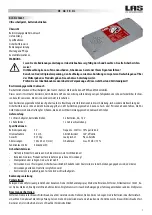
Chapter 3
48
Connecting Analog Input Signals
For the DT9857-08 and DT9857E-08 modules, you can connect up to eight analog input signals
(or IEPE sensors) to the BNC connectors on the module. For the DT9857-16 and DT9857E-16
modules, you can connect up to 16 analog input signals (or IEPE sensors) to the BNC
connectors on the module. Internally, these signals are connected in single-ended
mode. The
DT9857 and DT9857E modules support an input signal range of ±10 V (using a gain of 1) or
±1 V (using a gain of 10).
Note:
If you enable the use of the internal excitation current source for IEPE inputs, it is
recommended that you choose AC coupling. Refer to
for more information on IEPE
inputs.
shows how to connect an analog input signal (channel 0, in this case) to a BNC
connector on the DT9857 or DT9857E module.
Figure 17: Connecting Analog Input Signals
Signal
Source
Analog Input 0
Summary of Contents for Data Translation DT9857
Page 1: ...DT9857 and DT9857E UM 25656 M User s Manual Title Page ...
Page 4: ......
Page 10: ...Contents 10 ...
Page 14: ...About this Manual 14 ...
Page 25: ...Part 1 Getting Started ...
Page 26: ......
Page 40: ...Chapter 2 40 ...
Page 64: ...Chapter 4 64 ...
Page 71: ...Part 2 Using Your Module ...
Page 72: ......
Page 126: ...Chapter 6 126 ...
Page 132: ...Chapter 7 132 ...
Page 140: ...Chapter 8 140 ...
Page 180: ...Appendix B 180 ...
Page 181: ...181 C Register Level Programming Writing to the EEPROM Register 182 ...
Page 184: ...Appendix C 184 ...
Page 192: ...Index ...
















































